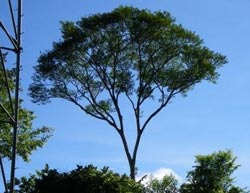Trees grow faster and store more carbon as they age

Tree measurement data from forests around the world shows that many trees do not slow in their growth rate as they get older and larger; instead, their growth keeps accelerating.<br><br>Credit: Photo courtesy of the Smithsonian Tropical Research Institute Archives<br>
The finding that most trees' growth accelerates as they age suggests that large, old trees may play an unexpectedly dynamic role in removing carbon from the atmosphere.
Richard Condit, staff scientist at the Smithsonian Tropical Research Institute, devised the analysis to interpret measurements from more than 600,000 trees belonging to 403 species.
“Rather than slowing down or ceasing growth and carbon uptake, as we previously assumed, most of the oldest trees in forests around the world actually grow faster, taking up more carbon,” Condit said. “A large tree may put on weight equivalent to an entire small tree in a year.”
“If human growth would accelerate at the same rate, we would weigh half a ton by middle age and well over a ton at retirement,” said Nate Stephenson, lead author and forest ecologist with the U.S. Geological Survey.
Whether accelerated growth of individual trees translates into greater carbon storage by aging forests remains to be seen. Programs like the United Nations REDD+ are based on the idea that forest conservation and reforestation mitigate global warming by reducing carbon dioxide in the atmosphere.
In 1980, the first large-scale tree plot was established in Panama in an effort to understand why tropical forests were so diverse. More than 250,000 trees with trunk diameters greater than 1 centimeter were identified and measured within a 50-hectare area.
“ForestGEO is now the foremost forest observatory system in the world with 53 plots in 23 countries and more than 80 partner institutions,” said Stuart Davies, ForestGEO director. “We hope that researchers continue to work with our data and our staff as they ask new questions about how forests respond to global change.”
The Smithsonian Tropical Research Institute, headquartered in Panama City, Panama, is a unit of the Smithsonian Institution. The Institute furthers the understanding of tropical nature and its importance to human welfare, trains students to conduct research in the tropics and promotes conservation by increasing public awareness of the beauty and importance of tropical ecosystems.
Media Contact
All latest news from the category: Agricultural and Forestry Science
Newest articles

Bringing bio-inspired robots to life
Nebraska researcher Eric Markvicka gets NSF CAREER Award to pursue manufacture of novel materials for soft robotics and stretchable electronics. Engineers are increasingly eager to develop robots that mimic the…

Bella moths use poison to attract mates
Scientists are closer to finding out how. Pyrrolizidine alkaloids are as bitter and toxic as they are hard to pronounce. They’re produced by several different types of plants and are…

AI tool creates ‘synthetic’ images of cells
…for enhanced microscopy analysis. Observing individual cells through microscopes can reveal a range of important cell biological phenomena that frequently play a role in human diseases, but the process of…





















